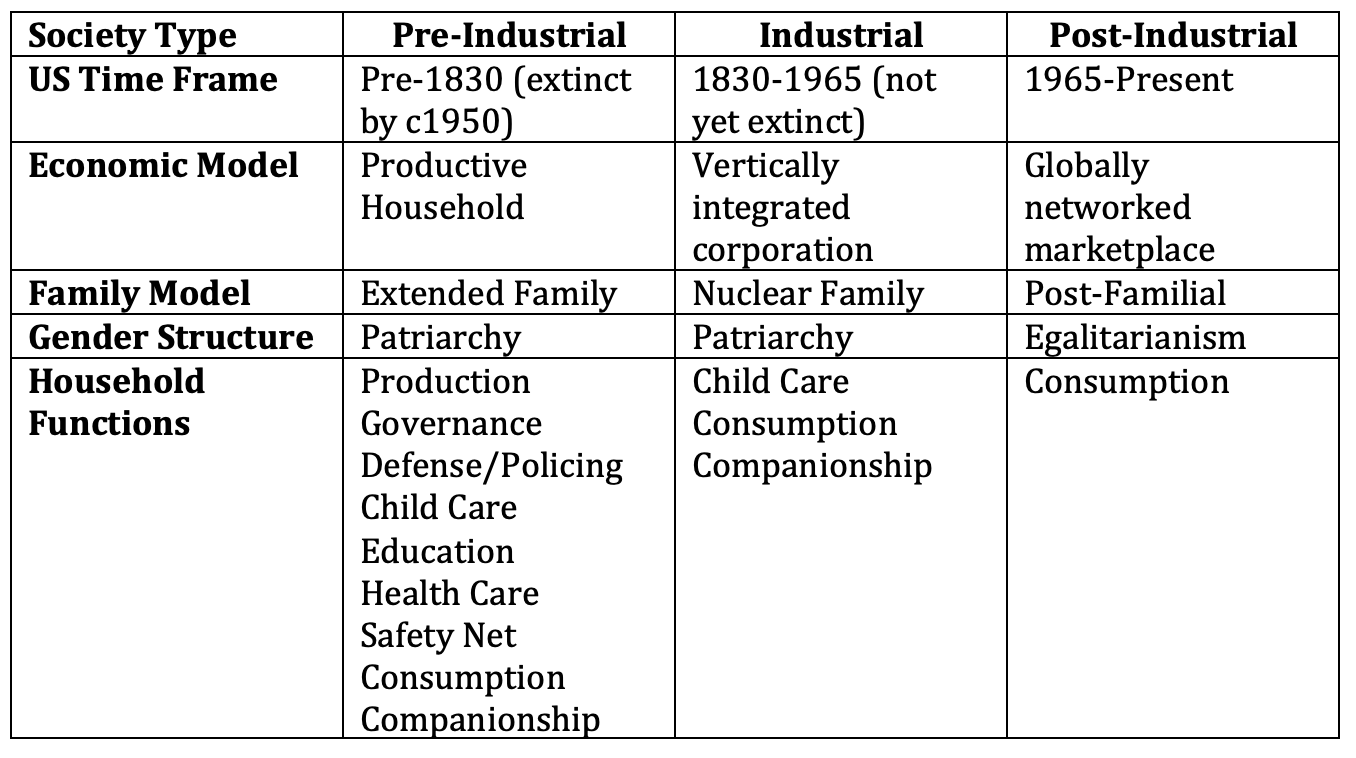My monthly deep dive newsletter will be out next week and looks at one of the gaps in our society’s thinking about femininity. In preparation for that, I wanted to highlight again the way that conservatives have failed to account for the impact of industrialization on the household in their thinking about gender roles.
Back in newsletter #26 I talked about how the shift to industrial and post-industrial society denuded the household of most of its functions. Here’s a chart I created to illustrate some of the shifts the occurred.
As I noted, conservatives often stick with the idea that women should primarily be in domestic roles, especially focused on childrearing. Christians will cite Titus 2:5 about women being “keepers at home.” But being a keeper at home had a much different connotation in pre-industrial society than it does today. For example, in the famous Proverbs 31 passage about finding a good wife, we see that her husband is a man of prestige, who is at the gates of the city representing the household in the governance of the polis. She is indeed based at home, but there she is overseeing a vast household economic enterprise.
In industrial society, the wife is reduced to a homemaker. This may have suited some women temperamentally or during certain stages of life such as when caring for young children, but it provided limited opportunities for women with high IQs or an orientation towards production to put their talents to use. This was part of the complaint of the early second wave feminists. The industrial era non-productive housewife who focuses on childrearing and housework is itself a historic anomaly.
Human societies have always had a strong sex role division of labor, but the female roles were historically productive ones. Today they are sub-productive (and uncompensated) appendages to the market economy, or what Ivan Illich termed “shadow work.” Shadow work includes commuting, “some assembly required” tasks and other such matters. But much of it is domestic work done by women. Illich compellingly argues that this is fundamentally different from character from pre-industrial household productive labor:
In most societies men and women together have maintained and regenerated the subsistence of their households by unpaid activities. The household itself created most of what it needed to exist. These so-called subsistence activities are not my subject. My interest is in that entirely different form of unpaid work which an industrial society demands as a necessary complement to the production of goods and services. This kind of unpaid servitude does not contribute to subsistence. Quite the contrary, equally with wage labor, it ravages subsistence [economic self-sufficiency]. I call this complement to wage labor ‘shadow work’. It comprises most housework women do in their homes and apartments, the activities connected with shopping, most of the homework of students cramming for exams, the toil expended commuting to and from the job. It includes the stress of forced consumption, the tedious and regimented surrender to therapists, compliance with bureaucrats, the preparation for work to which one is compelled, and many of the activities usually labelled ‘family life’.
Again, Illich is a radical, but he’s on to something here. This change in the nature of labor in the domestic sphere also helps explain the latent dissatisfaction of some women and the sense that their work is second rate. (Illich agreed with many feminist critiques but ended up getting cancelled avant la lettre for pointing out that the feminist attempts to eliminate the sex role division of labor made them the handmaidens of neoliberalism).
Life at home with kids is also not a happy existence for all women. Manosphere readers love to mock the childless “wine aunt,” but social media is likewise full of plenty of stay-at-home moms talking about drinking wine to help get through the day. That should tell us something. And even for those who thrive as stay at home moms, they only have children at home for a limited period of their adult life.
Conservatives by and large have failed to articulate a vision for women’s roles that is not either an embrace of the feminist vision of career on the male model, or a retro-50s homemaker model (minus the large amounts of community building activities women undertook back then). How women should develop and deploy their talents in today’s world? What roles should they seek apart from child rearing and house work?
I have observed that politicians and pastors frequently show a different kind of sex role partnership. These are often “family businesses” that function as productive household enterprises. The husband may be the front man, but the wives are hardly passive. Hillary Clinton and Michelle Obama were not just homemakers, they were key co-producers in their husbands’ political careers, then ultimately their own endeavors. Both they and their husbands profited enormously from this, including in building the wives’ brands. (Children too are often brought into the family business. In some political dynasties we see a true multi-generational extended family business, as with the Kennedys and Bushes). Pastors too are ofter a husband-wife team. In some cases they are even branded as co-pastors of the church. The wives too often benefit it terms of personal profile and brand. (They too often bring children into the family business, as it were).
I’m not saying everyone should follow this model. Not everyone has the luxury of building this type of personally productive sphere. But it does show that a productive partnership in the household can allow both husband and wife to develop and deploy their talents in ways that accrue to the benefit of both.
These as some things to keep in mind and think about between now and next week’s newsletter.






Agree totally with Joy Pullmann. The housewives when I was growing up (in the 70s) did the volunteer work and were a type of social glue. They raised money for charity, organized parties, helped at schools, etc. That is huge social capital that is lost with massive entry into the job market
I have many thoughts on this because it's a very personal topic for me (full-time working mom of six kids we don't put in daycare). You have some good thoughts here but I think you're missing some things.
One of those is the fact that women who are freed from the demands of paid labor can use -- and historically have used! -- that time in many productive ways that are not well compensated and cannot be, such as caring for the poor, or for other members of the family besides children. This is not only a massive potential social benefit but also a large benefit to a family -- who in old age wouldn't prefer to be cared for by one's own family rather than shuffled along between confusing and impersonal health providers? Who in time of prime-age sickness or trouble such as the aftermath of having a baby or suddenly coming down with cancer would not benefit significantly from an available helpful family member? Who in time of sadness or depression would not benefit from meals and conversations and participating in family life that can be offered by a woman who has a family life to offer people beyond her children?
The commercialization of these sorts of social functions, and the separation of them from family, has often meant that they simply are not done, or are done poorly. And the most vulnerable suffer as a result. And they have historically been offered as a service of love by women, who as a sex are much better suited to human care than men are as a whole. With women being diverted to full-time paid work, there are fewer and fewer people "keeping the lights on at home," not just in the intensive time of young children but also for any of the other MYRIAD significant needs that come up among an extended family in a normal life cycle.
It's because I spend a significant amount of my time in paid work that I am able to see what is not being done because of that major time commitment. Yes, I get huge intellectual stimulation and satisfaction from my job. But it's key to be careful that this personal satisfaction is not coming at the cost of the needs of those I owe care and support -- namely my children, husband, sisters, brothers, father and mother, not to mention my church family.
This is just one thing I think you're missing in your analysis -- the fact that the "housewife" model is not at ALL about "being home to clean and cook with the messy little kids." It's about being a nexus and offerer of massive social capital to those you love. Being able to do that ON DEMAND requires flexibility and freedom that is very hard to square with a full-time job.